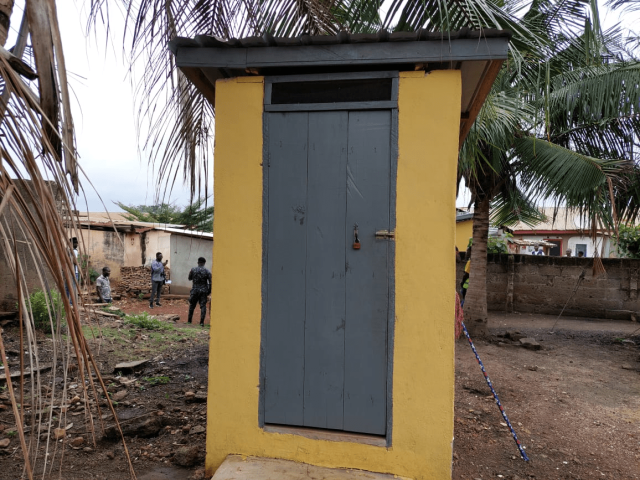By Nicholas Osei-Wusu
With 18 months to the end date for implementation of the Greater Kumasi Metropolitan Area Sanitation and Water Project, about 10,000 out of the targeted 30,000 houses have signed up for the ‘One House, One Toilet’ intervention aimed at ending open defecation in communities.
On the other hand, construction of 129 out of the 130 institutional sanitation facilities is set for completion almost one year ahead of the deadline.
It came to light during an inspection tour of some of the projects by the sector Minister, Madam Cecilia Dapaah, that the sanitation facilities for the selected public basic schools have provision for the menstrual needs of adolescent girl pupils so as to address the challenges such girls encounter during their monthly menstrual cycles while in school.
The Greater Kumasi Metropolitan Area Sanitation and Water Project is a four-year intervention being implemented by the government of Ghana through the Ministry of Water Resources and Sanitation in partnership with selected local assemblies in the Ashanti region.
The project began in 2020 with a World Bank facility of about 73 million Dollars to promote personal and environmental hygiene at the household and institutional levels.
At the household level, the project has been targeted to support 30,000 houses within the Greater Kumasi Metropolitan Area, which involves Kumasi and the adjoining municipalities.
Official data indicate that with 18 months to the project deadline of December 2024, 10 thousand houses have so far signed up to the initiative, which provides about 80 percent of the entire cost of the construction of the household toilet facility.
During an inspection tour of Ejisu Besease in the Ejisu Municipality, it came out that many more houses are showing interest in the intervention, with some of them already benefiting from it.
Adwoa Nyarko and Kwaku Frimpong paid 1,200 Ghana Cedis each to have the entire facility constructed for them.
They both shared that it has saved them and their relatives from the ordeals they used to go through in accessing the only public toilet in the town that closes at 8 p.m. each day.
The Project Coordinator, George Asiedu, told GBC that, ultimately, land lords and land ladies who fail to provide toilet facilities will be prosecuted.
The Minister for Water Resources and Sanitation, Madam Cecilia Dapaah, and her team also inspected some of the ongoing institutional sanitation facilities to learn firsthand about the progress and quality of the work being done.
They visited the one being provided for the Kentinkrono M/A Basic School in the Oforikrom Municipality, where she also interacted with some of the schoolchildren.
At the Asokwa-Amakom Junior High School in the Asokwa Municipality, the Minister was happy that the new 11-seater toilet facility is progressing steadily, with an assurance from the contractor that work would be completed by August this year.
Upon completion and handing over, the facility will replace the existing one, said to have been built about 71 years ago.
Their last port of call was the SDA Cluster of Basic Schools at South Suntreso in the Kumasi Metropolis, which had gotten to the roofing level.
So far, 129 public basic schools and hospitals have benefited from the project.
Those for the schools are also disability-friendly.
Madam Dapaah noted that the facilities have been specially designed to cater for the health needs of adolescent girls in the beneficiary schools during their monthly menstrual cycles.
She explained that a bathroom has been provided in each of the facilities for adolescent girl pupils who ‘soil themselves’ while in school to clean themselves and change over to avoid the associated embarrassment.
The Minister also disclosed that the facilities are disability-friendly to engender social inclusion.
The project is to be replicated in more districts after the pilot implementation period to help stop open defecation and promote health hygiene at the personal and institutional levels.


















